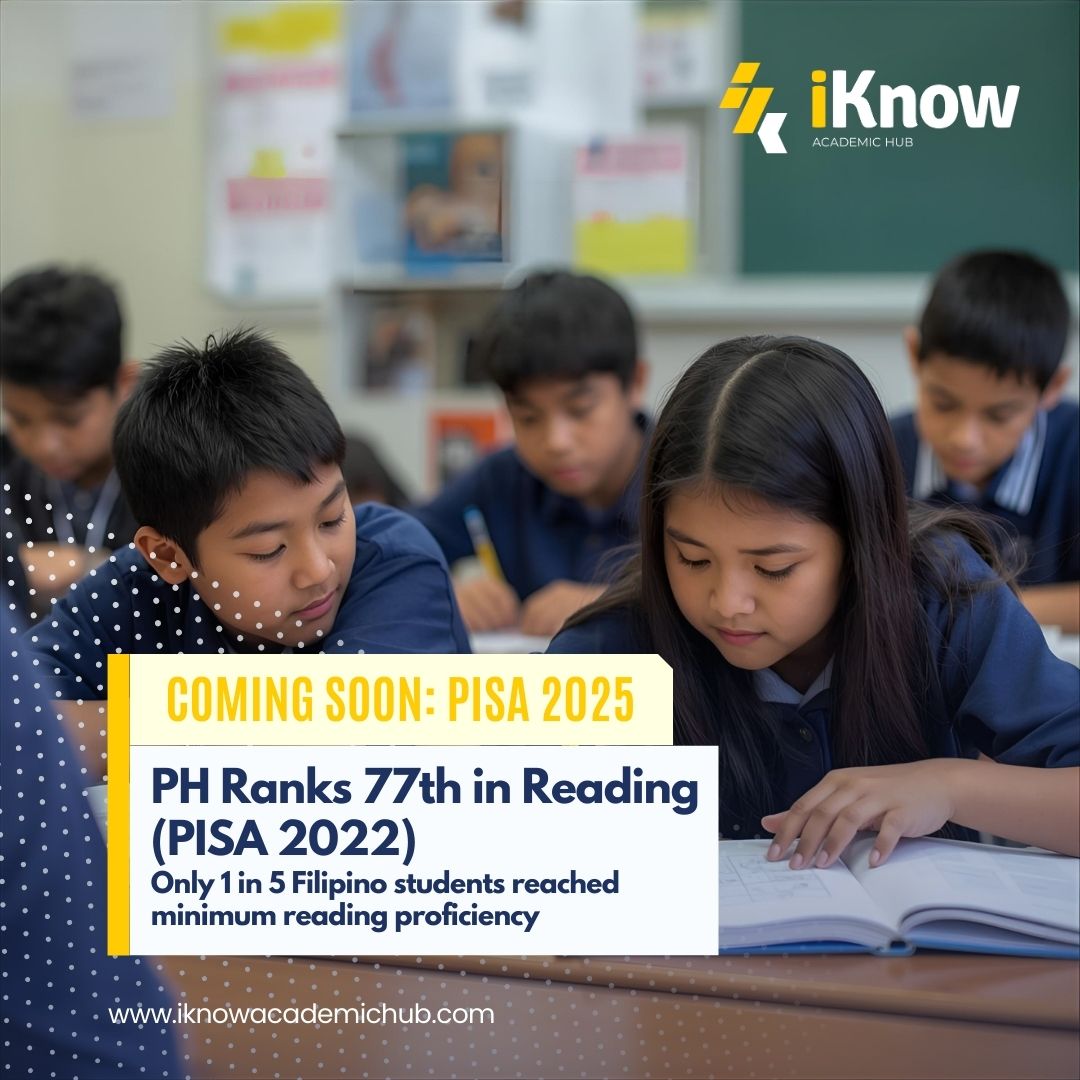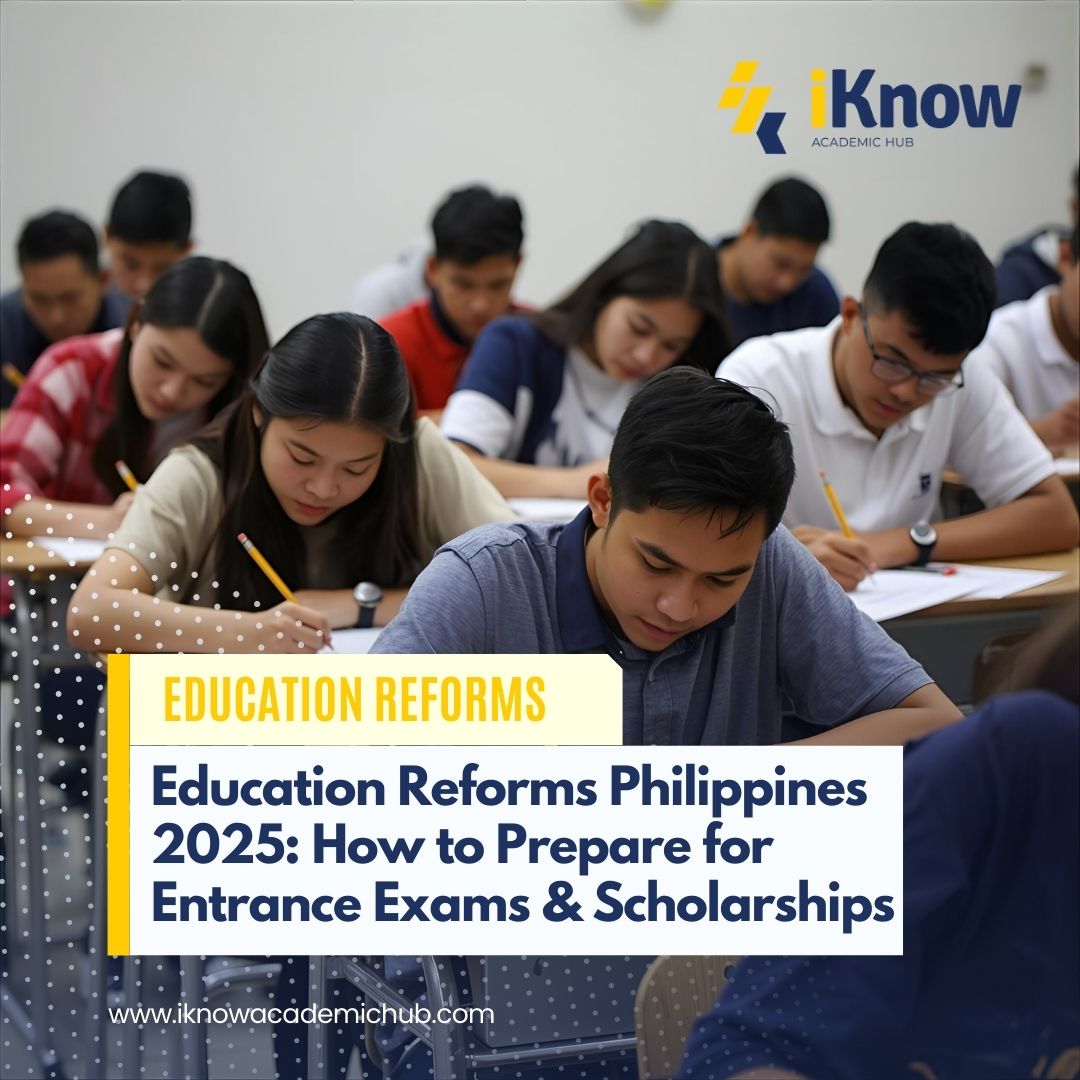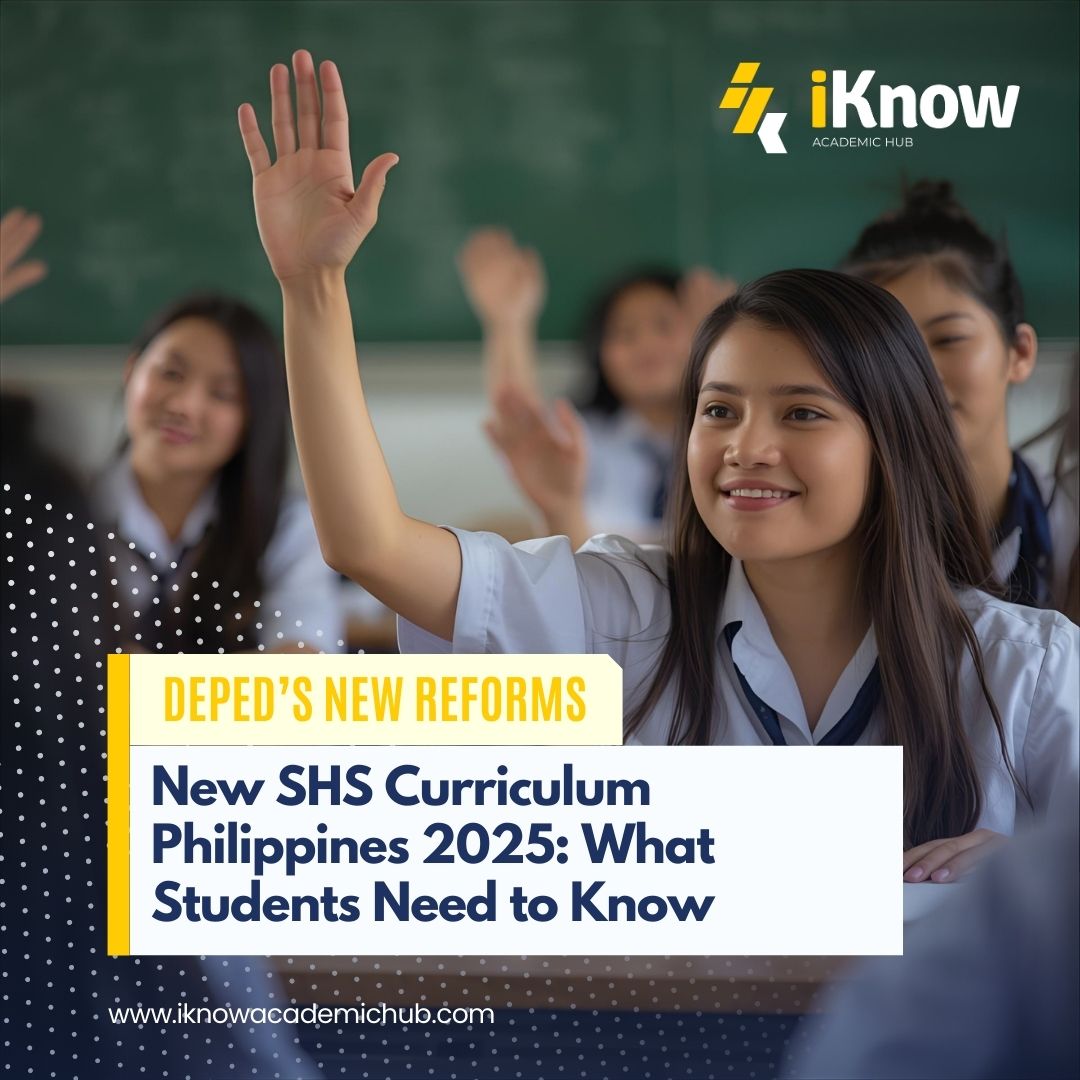What the Philippines Can Learn from International Proficiency: Reading, Math & Science Benchmarks vs Our Schools
Fri Sep 19 2025

The Philippines’ education system continues to struggle when measured against international benchmarks. In the PISA 2022 results, Filipino students ranked 77th out of 81 countries in reading, math, and science — showing a clear gap in Philippines education proficiency international benchmarks1.
Meanwhile, the PISA 2025 cycle is already underway, and the Philippines completed its participation in the assessment’s data collection last April 20252. Results are expected to be released in 2026, giving hope that ongoing reforms and interventions will reflect positively in the outcomes.
At iKnow Academic Hub, we believe that by learning from international best practices and adapting them locally, Filipino students can build stronger skills to compete not only in entrance exams but also on the global stage.

The Global Picture: Why International Benchmarks Matter
Top-performing countries such as Singapore, Japan, and South Korea consistently dominate international benchmarks like PISA1. Their strength lies in:
-
Teacher training and continuous professional development
-
Aligned curriculum standards emphasizing problem-solving and critical thinking
-
Early literacy and numeracy interventions to build strong foundations
-
Use of data-driven strategies to improve outcomes
These nations demonstrate that systemic commitment to education reform pays off in global rankings, providing valuable insights for improving Philippines education proficiency international benchmarks.
The Philippines’ Education Proficiency in International Benchmarks

Mean performance in mathematics, reading and science in PISA 2022
Philippines, OECD average and selected comparison countries
Source: OECD, PISA 2022 Database, Tables I.B1.2.1, I.B1.2.2 and I.B1.2.3.
The Philippines remains near the bottom of the rankings in PISA 20221. Contributing factors include:
-
Learning loss from the pandemic, which worsened existing gaps2
-
Limited access to teacher upskilling and professional development3
-
A curriculum that is broad but shallow, making it difficult for students to achieve mastery in reading, math, and science3
These challenges highlight why the country continues to underperform compared to international benchmarks.
Lessons from Other Countries
What can the Philippines learn from top-performing education systems?
-
Invest in Teachers – Provide continuous training and professional support to raise teaching quality1.
-
Curriculum Focus – Streamline content to emphasize mastery of essential skills over breadth3.
-
Early Literacy & Numeracy Programs – Prioritize reading and math proficiency from the primary years1.
-
Assessment & Accountability – Use regular evaluations to guide policy, instruction, and interventions1.
By applying these lessons, the Philippines can gradually close the proficiency gap and improve its education proficiency in international benchmarks.
Action Steps for Students & Schools
While policy reforms take time, there are immediate actions that can be taken:
-
For Students: Strengthen critical thinking by practicing with structured review materials, timed mock exams, and application-based problem solving.
-
For Parents: Provide encouragement at home and foster habits of reading and independent learning.
-
For Schools: Collaborate with trusted review centers to bridge learning gaps and prepare students for both entrance tests and international benchmarks.
At iKnow Academic Hub, we integrate these best practices in our programs. Our Comprehensive UPCAT Review offers updated review materials, expert-led tutorials, and mock exams aligned with the skills tested in both local entrance exams and international benchmarks.
You can also experience our approach through a 1-week free trial—giving you access to our teaching methods, review materials, and online platform at no cost.
-
Enroll here: Comprehensive UPCAT Review Enrollment Form
-
Free trial registration: Comprehensive UPCAT Review FREE Trial
Conclusion
Although the Philippines currently lags in education proficiency based on international benchmarks, there is clear opportunity for growth. With stronger teacher training, a streamlined curriculum, and active student and parent engagement, the country can achieve progress.
At iKnow Academic Hub, we are committed to helping Filipino students close the gap in Philippines education proficiency international benchmarks by offering structured reviews and smarter preparation for both local and global challenges.
Sources
- OECD. PISA 2022 Results. https://www.oecd.org/pisa/
- Philippine News Agency. Philippines Completes PISA 2025 Data Collection (April 11, 2025). https://www.pna.gov.ph/articles/1247939
- Second Congressional Commission on Education (EDCOM II). Philippine Education Report 2023. https://edcom2.gov.ph
Read more blogs
See all blogs
18 Million Graduates: Understanding Functional Illiteracy in the Philippines & What Students Can Do
Mon Sep 15 2025The Philippine Statistics Authority recently revealed a startling fact: over 18 million high school graduates are considered functionally illiterate in the country1. This crisis points to the urgency of addressing functional illiteracy Philippines 2025, where students may be able to read words but struggle to understand or apply their meaning in real-life situations. For learners aiming to pass entrance exams and succeed in higher education, this finding highlights the need for stronger academic preparation and support. At iKnow Academic Hub, we believe that smarter preparation builds stronger futures—and addressing this issue starts now. Why Functional Illiteracy in the Philippines Happens? Functional illiteracy goes beyond not knowing how to read. A functionally illiterate student can recognize words but fails to grasp their meaning in context. For example, they may read a short passage but be unable to answer comprehension questions or apply the information to problem-solving. This challenge directly impacts performance in standardized tests, college entrance exams, and even workplace tasks that require analytical thinking. Why Functional Illiteracy Happens Several factors contribute to the functional illiteracy crisis in the Philippines: Weak foundation in early reading and comprehension Overemphasis on rote memorization instead of understanding Limited access to remedial and support programs Unequal educational resources, especially in public schools Disruptions in learning continuity, especially during the pandemic As UNICEF Philippines has emphasized, the country faces a learning crisis where millions of students fall behind in basic literacy and numeracy skills2. The Impact on College & Careers Functional illiteracy doesn’t just affect reading scores. It has long-term consequences for students: College Entrance Exams: Tests like UPCAT, ACET, DCAT, and USTET are not just about recalling facts but require strong comprehension and reasoning skills. Students with weak foundations struggle to interpret complex questions. Scholarship Opportunities: Many scholarships, including DOST-SEI, require high scores in exams that measure problem-solving and comprehension. Career Readiness: Employers value graduates who can analyze, communicate, and apply knowledge. Functionally illiterate graduates often find it difficult to compete in today’s job market. What Students Can Do The good news is that functional illiteracy can be addressed with consistent effort and the right support. Here’s how students can take charge: Improve Comprehension Skills: Practice reading actively—summarize passages, highlight key ideas, and ask critical questions about what you’ve read. Join Review Centers Focused on Thinking Skills: Instead of relying solely on memorization, choose programs that emphasize comprehension, reasoning, and application. Read Widely: Explore both English and Filipino texts, from news articles to short stories, to strengthen vocabulary and cultural context. Take Advantage of Free Trials: Before committing to long-term programs, students can explore free offerings that demonstrate effective teaching strategies. At iKnow Academic Hub, we design programs that directly target the root of functional illiteracy—poor comprehension and weak application skills. Our Comprehensive UPCAT Review includes notes, quizzes, lecture videos, and mock exams that help students build both knowledge and understanding. One-Year Access: Learn at your own pace with complete coverage of UPCAT subjects. Critical Thinking Emphasis: Move beyond memorization and develop reasoning skills needed for exams and real-life success. Free Trial Week: Experience our teaching methods, review materials, and platform for one week at no cost. 📌 Enroll now: Comprehensive UPCAT Review Enrollment Form📌 Try our 1-week free trial: Free Trial Registration The figure of 18 million functionally illiterate graduates in the Philippines is not just a statistic—it’s a wake-up call1. Students must act early to strengthen comprehension and reasoning skills to succeed in exams, scholarships, and careers. At iKnow Academic Hub, we believe that smarter reviews lead to stronger futures. By addressing functional illiteracy today, students can unlock opportunities for tomorrow. References South China Morning Post. Philippines’ education crisis: 18 million high school graduates are ‘functionally illiterate’, government says. Retrieved from: https://www.scmp.com Philstar. UNICEF warns of learning crisis in the Philippines. Retrieved from: https://www.philstar.com
Read more
How Education Reforms Will Impact College Entrance & Scholarship Opportunities
Mon Sep 15 2025Big changes are coming to Philippine education. With the K–12 curriculum revisions, the DepEd MATATAG agenda, and updates in teacher licensure exams, the country is reshaping how students learn and how schools prepare them for higher education. These education reforms Philippines 2025 aim to close learning gaps, improve employability, and strengthen students’ readiness for college and global opportunities. But what do these reforms mean for students facing tough entrance exams like the UPCAT, ACET, and DCAT—and for parents seeking scholarships such as those from DOST-SEI and CHED? Let’s break it down. Impact on College Entrance Exams Education reforms are expected to affect how entrance exams are designed and evaluated. Possible Adjustments to Test Coverage: With streamlined SHS subjects and a stronger focus on foundational skills, exams like UPCAT may emphasize fewer topics but require deeper understanding. Critical Thinking Over Memorization: Expect a bigger push on problem-solving, data interpretation, and application of concepts—skills that go beyond memorizing formulas. Leveling the Playing Field: Students from both public and private schools could benefit as reforms aim to standardize core competencies nationwide. Impact on Scholarships For many families, scholarships are the gateway to quality higher education. DOST-SEI Scholarships: With reforms targeting stronger science and math foundations, students may perform better in the STEM-heavy DOST exams. CHED Scholarship Programs: Better English and communication skills, highlighted under reforms, align with CHED’s requirements for academic and merit-based grants. Global Opportunities: International scholarships and exchange programs will look more favorably on Filipino students trained under an updated, skills-based curriculum. For Parents & Students: How to Stay Ahead Reforms are promising, but they also mean competition for top schools and scholarships will be tougher. Early preparation is key. Start Early: Don’t wait until your senior year to prepare for entrance exams. Build habits in reading comprehension, math, and science as early as Grade 9. Choose the Right Review Program: Look for programs that align with the reforms—those that train critical thinking, not just memorization. Leverage Free Resources First: Test the waters through trial programs before committing to a full review. Preparing with iKnow Academic Hub At iKnow Academic Hub, we designed our review programs with these reforms in mind. Our Comprehensive UPCAT Review helps students master critical concepts through lecture notes, quizzes, videos, and mock exams. We offer flexible packages to fit your needs: Bronze Package (₱1,999 until Oct. 31, 2025):One-year access to pre-recorded lectures, quizzes, and supplementary reviewers.Enroll here Silver Package (₱4,999 until Oct. 31, 2025):Includes everything in Bronze PLUS 60 hours of live Zoom sessions (with replays).Enroll here Not sure yet? Experience our teaching style, review materials, and online platform for one week free—no cost, no commitment.Register for the Free Trial The education reforms Philippines 2025 are designed to empower Filipino learners for the future. But reforms alone aren’t enough—preparation and guidance make the difference between passing and excelling. At iKnow Academic Hub, we believe smarter preparation builds stronger futures. Start your journey today and take advantage of our Comprehensive UPCAT Review to secure your spot in the country’s top universities and scholarship programs.
Read more
What the New SHS Curriculum Philippines 2025 Means for Students & How to Prepare
Sat Sep 13 2025The New SHS Curriculum Philippines 2025, officially known as the Strengthened Senior High School (SHS) Curriculum, comes at a crucial moment in Philippine education. DepEd revised SHS because of ongoing learning gaps, the need to make graduates more employable, and to ensure better alignment with higher education¹.For students, this means the way you study, the subjects you take, and the skills you need are shifting. As part of iKnow Academic Hub’s mission to make academic preparation smarter and accessible, this post breaks down what has changed, what it means for you, and how you can prepare to succeed under the new system. Key Changes in the 2025 SHS Curriculum Here are the major reforms introduced under the New SHS Curriculum: Change Details Reduced core subjects Previously there were around 15 core subjects. Now there are only five core subjects: Effective Communication or Mabisang Komunikasyon, General Mathematics, General Science, Life and Career Skills, and Pag-aaral ng Kasaysayan at Lipunang Pilipino². Adjusted strand or elective structure The old model with four tracks (Academic, ABM, HUMSS, TVL) is being realigned into two main pathways: Academic Track and Technical-Professional (TechPro) Track. Students will choose electives grouped in clusters under these pathways, rather than rigid strands³. Emphasis on foundational skills and fewer overlapping subjects The curriculum aims to decongest learning, reduce overlap between subjects, and place greater stress on foundational skills such as reading comprehension, communication, critical thinking, and numeracy¹. Electives are designed to be more flexible, letting students focus on areas aligned with their goals. Pilot implementation It starts with Grade 11 in SY 2025–2026 in selected pilot schools. Full roll out for Grade 12 and for all schools follows after². Implications for Students What does this mean for you, as a SHS student? Daily Workload and Subject Load Because there are fewer core subjects, your schedule may feel more focused. However, electives still demand effort, especially under TechPro or specialized clusters. With the electives, more responsibility rests on selecting what fits with your interests and future plans. What Skills You Should Strengthen Mathematics and Science: General Mathematics and General Science remain core, so being strong in these helps. Reading Comprehension and Communication: With Effective Communication or Mabisang Komunikasyon being a core subject, both English and Filipino communication skills are key. Critical thinking, problem solving, life and career skills: These are explicitly part of the core. Being able to apply concepts rather than just memorize will be more important. Strategic Elective Choices Electives now come in clusters. For example, Academic electives include clusters like STEM, Business and Entrepreneurship, Arts, Social Sciences and Humanities, Sports, Health and Wellness, and Field Experience³. TechPro electives include clusters such as Agriculture and Fishery Arts, ICT, Industrial Arts, Maritime, and others⁴. Choose electives that align with what you might want to study in college, or what career you might aim for. Assessment, Grading, Immersion New guidelines for assessment under the strengthened curriculum introduce adjustments in how you are graded (core vs elective subjects)⁵. Work immersion hours may increase depending on track or specialization. Real world experience is more emphasized². How to Prepare Here are concrete ways students can adapt and get ready: Good Study Habits Build strong foundations early. Do not wait until your electives begin. For example, keep up with math and science even if your electives are in business or arts. Practice reading and writing often in both English and Filipino to keep up with communication demands. Time management is key. Fewer core subjects does not mean easier. Managing your electives and merging tasks like projects and immersion work will matter more. Use Supplementary Review Centers Places like iKnow Academic Hub can help fill any gaps, especially in foundational math, science, or language skills. Reviews targeting thinking skills, exam practice, and soft skills can give you an edge. Leverage Digital Tools and Technology Online resources such as videos, interactive exercises, and apps can help make subjects like General Science or Mathematics more understandable. Utilize digital platforms for practice tests, peer learning, or simulations, especially for electives or immersion components. Make Informed Elective Choices Early Talk to guidance counselors about your interests and your college or career plans. Explore the clusters available in your school. If your school lacks certain electives, plan ahead. You may need extra work or self study. The New SHS Curriculum Philippines 2025 offers you a chance to focus on what really matters. Build foundational skills, choose what you want to specialize in, and prepare not just for passing but for succeeding. Yes, change can be challenging, but with the right mindset and tools, this new path can lead to stronger outcomes. At iKnow Academic Hub, we believe smarter preparation builds stronger futures. We have tutorials, review programs, and resources specifically designed for the strengthened SHS Curriculum, so you can confidently take on your core subjects, choose the right electives, and be future ready. Join our programs today and get the guidance you need to succeed. References Department of Education (DepEd). SHAPE Paper on the Strengthened SHS Curriculum. https://www.deped.gov.ph/wp-content/uploads/SHAPE-PAPER-BCD-a_o-May-22.pdf DepEd. DM 048, s. 2025: Pilot Implementation of the Strengthened Senior High School Curriculum for Grade 11 in SY 2025–2026. https://www.deped.gov.ph/2025/06/15/june-14-2025-dm-048-s-2025-pilot-implementation-of-the-strengthened-senior-high-school-curriculum-for-grade-11-in-school-year-2025-2026 DepEd. Strengthened SHS Program Overview. https://www.deped.gov.ph/strengthened-shs-program Philippine Institute for Development Studies (PIDS). New Senior High School Curriculum: DepEd explains how it will roll out. https://www.pids.gov.ph/details/news/in-the-news/new-senior-high-school-curriculum-deped-explains-how-it-will-roll-out DepEd. DM 074, s. 2025: Assessment Guidelines under the Strengthened SHS Curriculum. https://www.deped.gov.ph/wp-content/uploads/DM_s2025_074r.pdf
Read more

